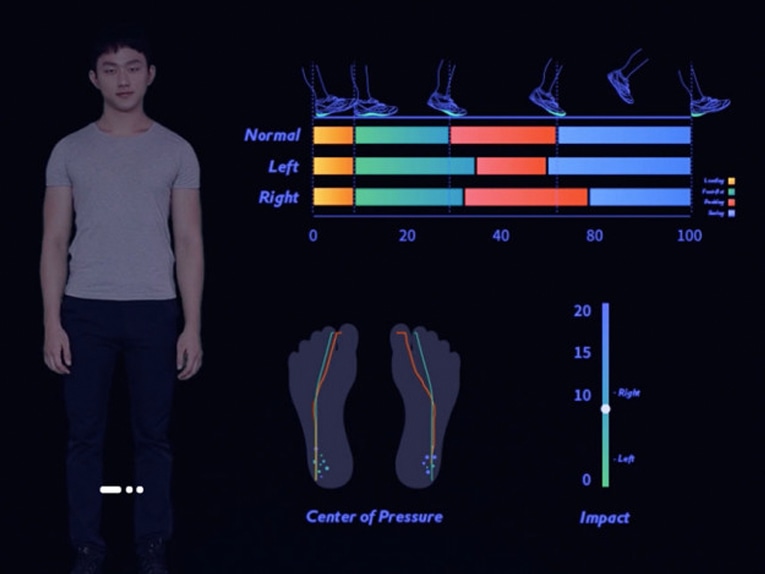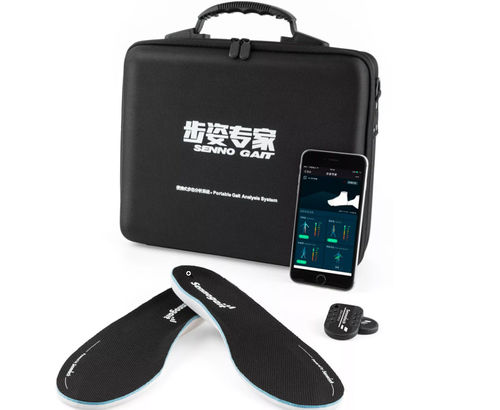
#Industry News
Sennotech offers affordable gait analysis on a mobile phone
Sennotech’s smart gait analysis system helps users choose comfy shoes, improve sports performance and foot health, and facilitate rehabilitation training
At the 2017 Chongli 100 Ultra Sky Trail Challenge cross-country race in Chongli, a small town 220km northwest of Beijing where the ski competitions of the 2022 Winter Olympics will take place, runners were walking around a line of booths before the race.
Wearing insoles provided by BiggER, a runner training club and one of the race sponsors, they moved around for less than one minute, and then read their gait analysis report in a smartphone app. The report showed them the quality of their gait, and the potential health problems that could result from abnormal walking patterns, such as in-toeing and out-toeing.
BiggER is one of the partners of Shenzhen-based Sennotech, the startup that developed the Senno Gait device kit used in the gait testing at Chongli. The idea behind gait-testing insoles dates back to 2012, when Xu Wenyao, then a PhD student at UCLA, co-wrote a research paper entitled, Smart Insole: A Wearable System for Gait Analysis, which presented “a novel portable system, called Smart Insole ... [that] integrates low-cost sensors and computes important gait features.”
Xu went on to co-found Sennotech in 2015, launching a smart insole product, Insole X, soon after. In early 2017, the company released an upgraded version: Senno Gait, which uses motion sensing and an AI model to calculate pressure distribution, instead of relying solely on pressure sensors.
Affordable, portable
Other systems for gait analysis do exist, but are prohibitively expensive. UK-based Vicon’s MX Giganet 6 × T40 and 6 × T160 devices are known for their optical motion capture systems, but they cost as much as £250,000.
“The precision is high, but only some big hospitals have it,” said Sennotech co-founder An Senwen, commenting on MX Giganet devices. In comparison, prices for a Senno Gait kit start at RMB 7,500, thanks to the sensor in Senno Gait that only costs a three-digit RMB figure.
Along with this cheap sensor is an AI model that uses algorithms to analyze the physiological data collected by a sensor under the smart insole. Users can read their gait analysis report generated by the device on a smartphone app, which informs them of their injury risks and incorrect movement patterns.
“Now our cloud database has got a mature model empowered by 2m pieces of gait and posture data involving different human races, genders and age groups,” said Sennotech's CTO Li Zhinan.
Hospitals such as Sichuan Provincial Rehabilitation Hospital and People's Liberation Army General Hospital are now using Senno Gait in diagnosis and treatment. In August 2016, Sichuan Provincial Rehabilitation Hospital did a comparative test using Senno Gait and the CAREN system, which is being used by advanced clinical and research facilities for treatment and rehabilitation of walking. The test results showed that in terms of key gait indices such as stand phase and gait cycle, the mean error between the two was within 1%.
The portability of Senno Gait also makes it easier for sports trainers to carry the insoles around. BiggER, which has been Sennotech’s strategic partner since June 2017, has used Senno Gait to give runners training advice in its club training courses.
In April 2017, Sennotech formed a partnership with Orthogentic Technology (also known as FitsAmerica), an ankle-foot orthotic service provider in the US. Sennotech gait data services are now used at 150 Orthogentic Technology clinics to create custom orthotic insoles for patients.
Targeting individual customers
Customers can experience Sennotech's technology for themselves at the Beijing Wangfujing Street flagship store of Li-Ning, one of China’s biggest sportswear companies founded by the former gymnast who won six medals at the 1984 Olympic Games in Los Angeles. Sennotech has customized a shoe-choosing assistance system for Li-Ning based on its technology. The system helps detect foot problems in shoppers at the store, such as runner’s knee and issues caused by over-wearing of high heels.
Sennotech has also gone further to connect with consumers, using WeChat, China's most popular messaging and social networking app. It launched a WeChat mini-program called Posture Check in June 2018, a product extension based on its gait analysis system. This was the first mobile product in China that lets users use a smartphone to check for any health issues related to posture. And it's as convenient to use as Senno Gait: users only need to upload two body pictures (frontal and side shots) for the analysis. By late 2018, the mini-program had attracted over 100,000 users.
“We focus on risk assessment, and we'll inform doctors about the health risks to enable more efficient communication between them and the patients. But it is the doctor who will do the follow-up assessments. We only handle the screening,” said company CEO Li Qin.


